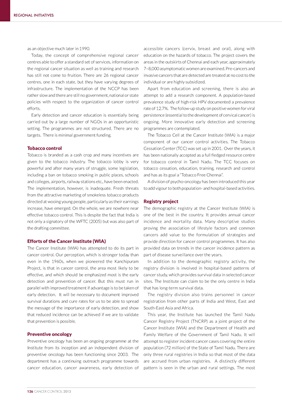
REGIONAL INITIATIVES
as an objective much later in 1990. accessible cancers (cervix, breast and oral), along with
Today, the concept of comprehensive regional cancer education on the hazards of tobacco. The project covers the
centres able to offer a standard set of services, information on areas in the outskirts of Chennai and each year, approximately
the regional cancer situation as well as training and research 7–8,000 asymptomatic women are examined. Pre-cancers and
has still not come to fruition. There are 26 regional cancer invasive cancers that are detected are treated at no cost to the
centres, one in each state, but they have varying degrees of individual or are highly subsidized.
infrastructure. The implementation of the NCCP has been Apart from education and screening, there is also an
rather slow and there are still no government, national or state attempt to add a research component. A population-based
policies with respect to the organization of cancer control prevalence study of high-risk HPV documented a prevalence
efforts. rate of 12.7%. The follow-up study on positive women for viral
Early detection and cancer education is essentially being persistence (essential to the development of cervical cancer) is
carried out by a large number of NGOs in an opportunistic ongoing. More innovative early detection and screening
setting. The programmes are not structured. There are no programmes are contemplated.
targets. There is minimal government funding. The Tobacco Cell at the Cancer Institute (WIA) is a major
component of our cancer control activities. The Tobacco
Tobacco control Cessation Center (TCC) was set up in 2001. Over the years, it
Tobacco is branded as a cash crop and many incentives are has been nationally accepted as a full fledged resource centre
given to the tobacco industry. The tobacco lobby is very for tobacco control in Tamil Nadu. The TCC focuses on
powerful and after many years of struggle, some legislation, tobacco cessation, education, training, research and control
including a ban on tobacco smoking in public places, schools and has as its goal a “Tobacco Free Chennai”.
and colleges, airports, railway stations etc., have been enacted. A division of psycho-oncology has been introduced this year
The implementation, however, is inadequate. Fresh threats to add vigour to both population- and hospital-based activities.
from the attractive marketing of smokeless tobacco products
directed at wooing young people, particularly as their earnings Registry project
increase, have emerged. On the whole, we are nowhere near The demographic registry at the Cancer Institute (WIA) is
effective tobacco control. This is despite the fact that India is one of the best in the country. It provides annual cancer
not only a signatory of the WFTC (2005) but was also part of incidence and mortality data. Many descriptive studies
the drafting committee. proving the association of lifestyle factors and common
cancers add value to the formulation of strategies and
Efforts of the Cancer Institute (WIA) provide direction for cancer control programmes. It has also
The Cancer Institute (WIA) has attempted to do its part in provided data on trends in the cancer incidence pattern as
cancer control. Our perception, which is stronger today than part of disease surveillance over the years.
even in the 1960s, when we pioneered the Kanchipuram In addition to the demographic registry activity, the
Project, is that in cancer control, the area most likely to be registry division is involved in hospital-based patterns of
effective, and which should be emphasized most is the early cancer study, which provides survival data in selected cancer
detection and prevention of cancer. But this must run in sites. The Institute can claim to be the only centre in India
parallel with improved treatment if advantage is to be taken of that has long-term survival data.
early detection. It will be necessary to document improved The registry division also trains personnel in cancer
survival durations and cure rates for us to be able to spread registration from other parts of India and West, East and
the message of the importance of early detection, and show South-East Asia and Africa.
that reduced incidence can be achieved if we are to validate This year, the Institute has launched the Tamil Nadu
that prevention is possible. Cancer Registry Project (TNCRP) as a joint project of the
Cancer Institute (WIA) and the Department of Health and
Preventive oncology Family Welfare of the Government of Tamil Nadu. It will
Preventive oncology has been an ongoing programme at the attempt to register incident cancer cases covering the entire
Institute from its inception and an independent division of population (72 million) of the State of Tamil Nadu. There are
preventive oncology has been functioning since 2003. The only three rural registries in India so that most of the data
department has a continuing outreach programme towards are accrued from urban registries. A distinctly different
cancer education, cancer awareness, early detection of pattern is seen in the urban and rural settings. The most
126 CANCER CONTROL 2013